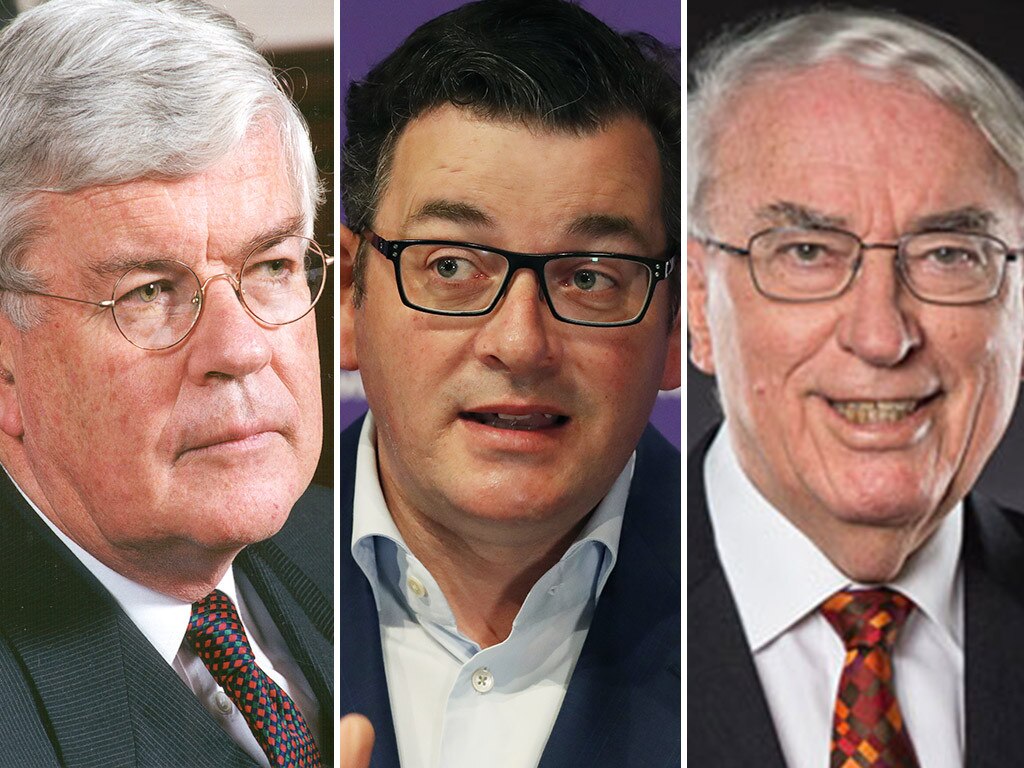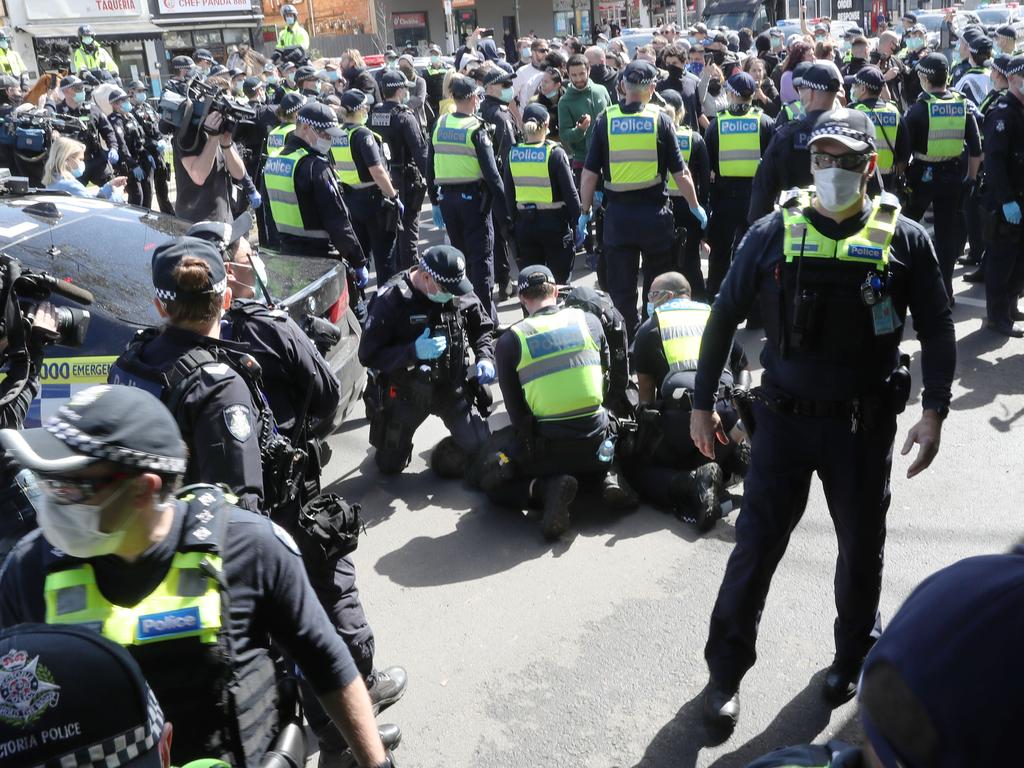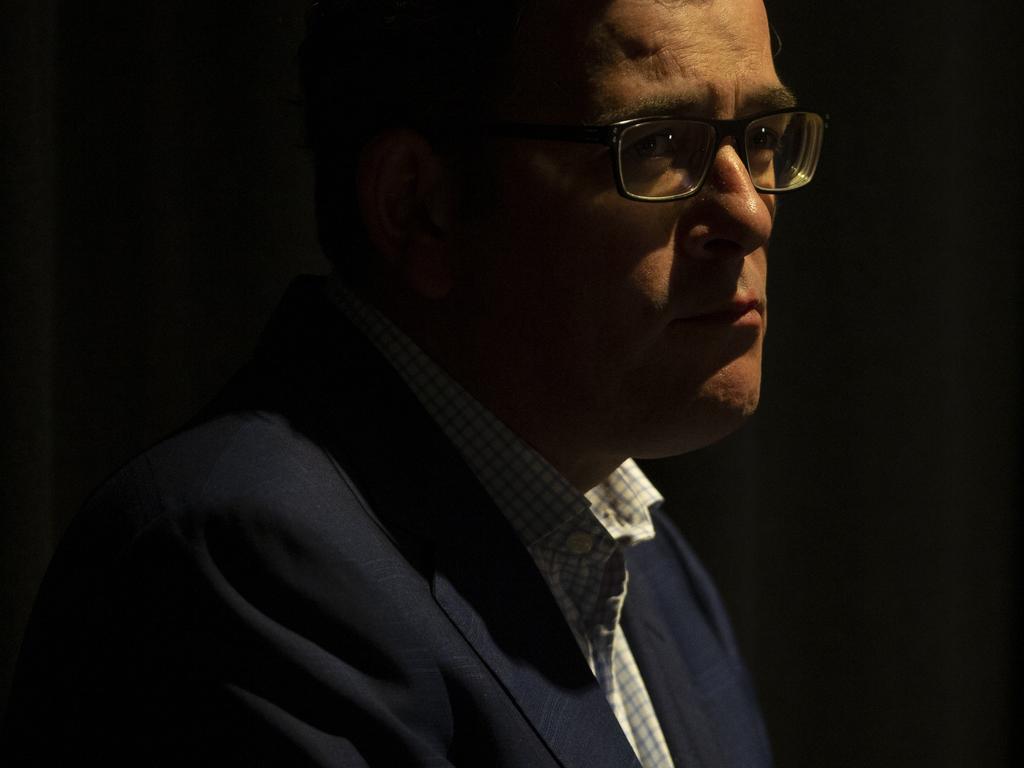Coronavirus: Andrews unsure of omnibus laws amid the new push against them
Daniel Andrews has been unable to specify circumstances during the pandemic so far where hardline new laws had been required.

Victorian Premier Daniel Andrews says he is “not sure” whether there have been any instances in the coronavirus pandemic so far where a different outcome would have been achieved with hardline new laws which would enable people to be detained on suspicion that they may be at risk of breaching coronavirus restrictions.
The Andrews government is seeking to pass legislation as part of an otherwise uncontroversial “COVID-19 Omnibus (Emergency Measures) and Other Acts Amendment Bill”, which would allow any person the Department of Health and Human Services deems appropriate to become an “authorised officer”, and enable authorised officers to detain people on the belief that they are unlikely to comply with emergency directions.
Mr Andrews on Wednesday argued the provisions were necessary and would be applied in a “proportionate” manner, but the Premier was unable to specify circumstances where they had previously been required.
“I‘m not sure,” Mr Andrews said when asked whether he was aware of situations during Victoria’s coronavirus pandemic where having the legislation in place would have resulted in a different outcome.
“It would always be a fine judgment about whether these powers were used. That’s the key point here,” he said.
“These are not blanket decisions, and the fact that people have the power to do something, and the authority and clarity to do something, doesn’t presuppose that they will, and they will be required to make very detailed, personal, on the merits of the individual circumstances of the case, those fine judgments, and that in itself is a very important part of any process.
“These are not blanket rules, but we certainly have seen some people who have had the virus and been unwilling to follow the rules.
“We’ve had lots of different examples. I wouldn’t say it was hundreds or thousands of people, but it doesn’t need to be, but these would not be powers that would be exercised easily or lightly.
“They would be the subject of a chain of command, a structure, authority, oversight, and a very detailed and thorough analysis of the risk that that person posed and the likelihood that they would, that that risk would be real because of the choices they would make.”
Mr Andrews said the government was engaged in a “good-faith negotiation process” with the upper house crossbench, who hold 12 of 40 seats in the chamber, compared with Labor’s 17 and the Coalition’s 11.
“I’ve always resisted the temptation of predicting what happens in the upper house, and I shan’t change that habit today,” he said.
“In terms of the concerns that are raised, people are free to raise concerns.”
Asked why authorised officers needed powers to detain people who had not committed an offence, Mr Andrews said: “They are based on a reasonable belief principle, and they’re based on a proportionality principle about the risk of spreading COVID, and there are some people who are not compliant, refuse to act in a responsible and safe way.”
“Those powers would not be frequently used. They would be, I think, rare, but they are important.”
Not clear whether police asked for provisions
Mr Andrews was unable to say whether police had asked for the provisions.
“There‘s been a long discussion over quite some time about the number of authorised officers we have, the fact that different powers sit with different people and some improvements to that whole compliance arrangement,” he said.
“As to detailed correspondence and all of that, I’d need to come back to you on that, but it’s been an ongoing discussion that I know the Department of Justice and Community Safety and all of their stakeholders have been an important part of that.”
The Premier’s inability to say whose idea the laws were comes after his police chief and chief distanced themselves from the decision to impose a curfew on Melburnians, but Mr Andrews was unable to say whose idea it had been, and as a series of top bureaucrats have this week told the hotel quarantine inquiry that they do not know who mate the fateful decision to deploy private security guards as part of the program responsible for unleashing a second wave of coronavirus which has so far claimed more than 750 lives.
Challenged over the parallels, Mr Andrews said: “This is exactly why I‘m indicating to you that I’ll come back to you so we don’t all get into the word games.”
“(There’s been) long discussion about the need to make these improvements. Many have been involved in that, but on the specifics, I’ll come back to you.”
Mental Health Minister backs bill
Mental Health Minister Martin Foley said powers to compulsorily detain someone for mental health treatment necessarily involved a “very high bar”, arguing a lower threshold was necessary to protect public health.
“A very small number of people with highly complex needs sometimes expose themselves in all kinds of vulnerable circumstances, and we know from the experience of the past six months that sometimes those people can be challenging in how they engage with the rest of the community, and the kind of powers, short of compulsory detention for mental health support, but for public health support, are precisely the measured, reasonable circumstances that the omnibus bill contemplates,” Mr Foley said.
Barristers join attack on bill
The state and national peak bodies representing barristers earlier raised concerns about the bill, saying it enables people who have not committed an offence to be detained on “broad and subjective” grounds.
On Wednesday, the Victorian Bar and Australian Bar Association confirmed they had contacted Victorian Attorney-General Jill Hennessy to express their concerns regarding the criteria for appointment, and scope of powers, of “authorised officers” as part of the proposed amendments to the Public Health and Wellbeing Act 2008 made by the COVID-19 Omnibus (Emergency Measures) Bill.
“The Victorian Bar’s concerns about provisions of the Omnibus Bill, tabled in parliament on 17 September 2020, refer principally to the broad and generic criteria on which “authorised officer” appointments may be made under s. 30 of the Act,” the Victorian Bar said in a statement.
“The proposed criteria potentially open the door for those who are not trained as health professionals to be appointed as “authorised officers”.
“This is of significant concern as it is imperative that the qualifications of these officers are relevant to the public health functions that they are intended to perform.
“The Victorian Bar is also concerned with the proposal that people may be detained by authorised officers for failure to abide by a public health direction on the basis of an authorised officer’s “reasonable belief”.
“This standard of validation is broad and subjective. The power to detain should be reviewed against an objective standard, for example, one of ‘reasonable likelihood’.
“Furthermore, the public interest would best be served if decisions made by authorised officers were reviewed by the Chief Health Officer (or senior delegate) within a short, stipulated period (preferably not longer than 24 hours).
“In the Bar’s view, the power of detention should be expressly based on a test of the least restrictive means reasonably available in the circumstances to achieve public health and safety.”
Wendy Harris QC, President of the Victorian Bar, said: “It is vital that, as the Government crafts powers to assist in the enforcement of public health and safety regulations, the individuals who are empowered to enforce those powers meet appropriate standards of professional knowledge and training, and the enforcement of those powers meets common and well-tested standards of objectivity.“
“This is essential in order that public confidence is retained in the enforcement of public health measures, and that the rights of members of the community are protected,” Ms Harris said.
Matthew Howard SC, President of the Australian Bar Association, said: “The Australian Bar Association fully endorses the Victorian Bar’s position on this important matter.“
“Whilst the Victorian government needs to take appropriate measures to manage this extraordinary health crisis, these should not be implemented without appropriate oversight and protections,” Mr Howard said.







To join the conversation, please log in. Don't have an account? Register
Join the conversation, you are commenting as Logout